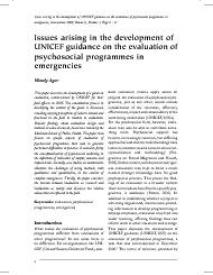Issues arising in the development of UNICEF guidance on the evaluation of psychosocial programmes in emergencies
This paper describes the development of a guide on evaluation, commissioned by UNICEF for their field officers in 2006. The consultation process in developing the content of the guide is discussed, revealing varying perceptions of what is known and practiced in the field in relation to evaluation. Broader findings about evaluation design and methods are also discussed, based on a review by the Mailman School of Public Health. The paper then focuses on specific aspects of evaluation of psychosocial programmes that seem to generate particular difficulties in practice. It considers firstly the conceptualisation of psychosocial wellbeing in the definition of indicators of output, outcome and impact levels. Secondly, case studies are examined to illustrate the challenges of using methods, both qualitative and quantitative, in the context of complex emergencies. Thirdly, the paper considers the tension between ‘evaluation as research’ and ‘evaluation as reality’ and discusses the relative values that are reflected in the field. Keywords: evaluation, psychosocial programmes, emergencies
Geachte bezoeker,
De informatie die u nu opvraagt, kan door psychotraumanet niet aan u worden getoond. Dit kan verschillende redenen hebben,
waarvan (bescherming van het) auteursrecht de meeste voorkomende is. Wanneer het mogelijk is om u door te verwijzen naar de bron
van deze informatie, dan ziet u hier onder een link naar die plek.
Als er geen link staat, kunt u contact opnemen met de bibliotheek,
die u verder op weg kan helpen.
Met vriendelijke groet,
Het psychotraumanet-team.
Reference:
Wendy Ager | 2008
In: Intervention: the international journal of mental health, psychosocial work and counselling in areas of armed conflict, ISSN 1571-8883 | 6 | 1 | 4-11
http://www.interventionjournal.com/sites/default/files/6.1_02_Ager.pdf
In: Intervention: the international journal of mental health, psychosocial work and counselling in areas of armed conflict, ISSN 1571-8883 | 6 | 1 | 4-11
http://www.interventionjournal.com/sites/default/files/6.1_02_Ager.pdf


